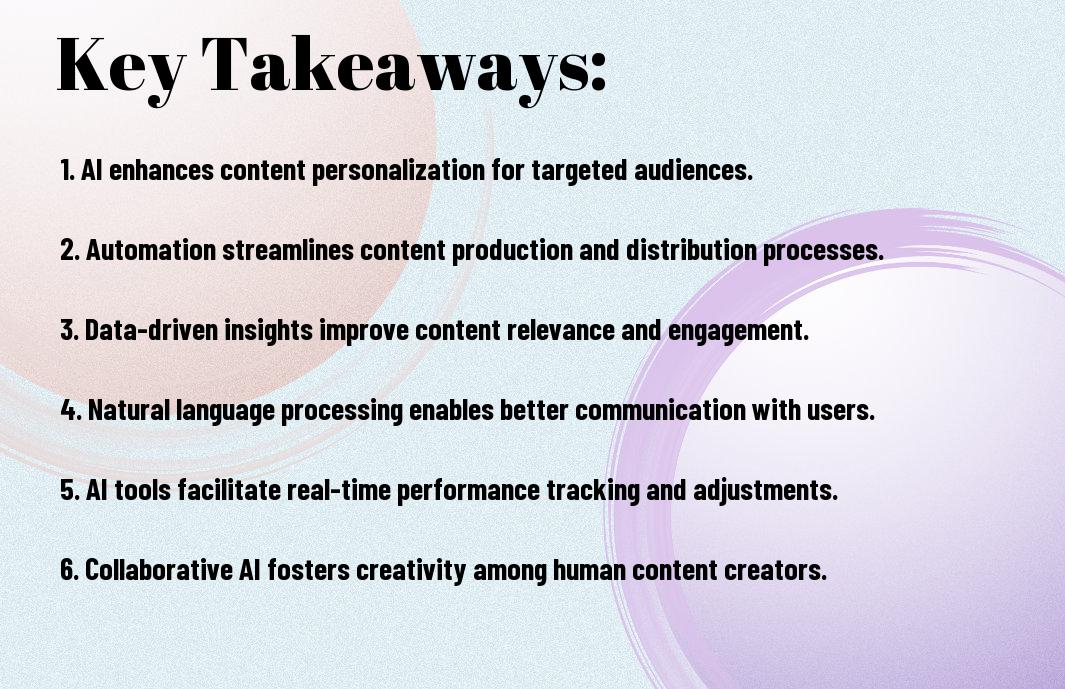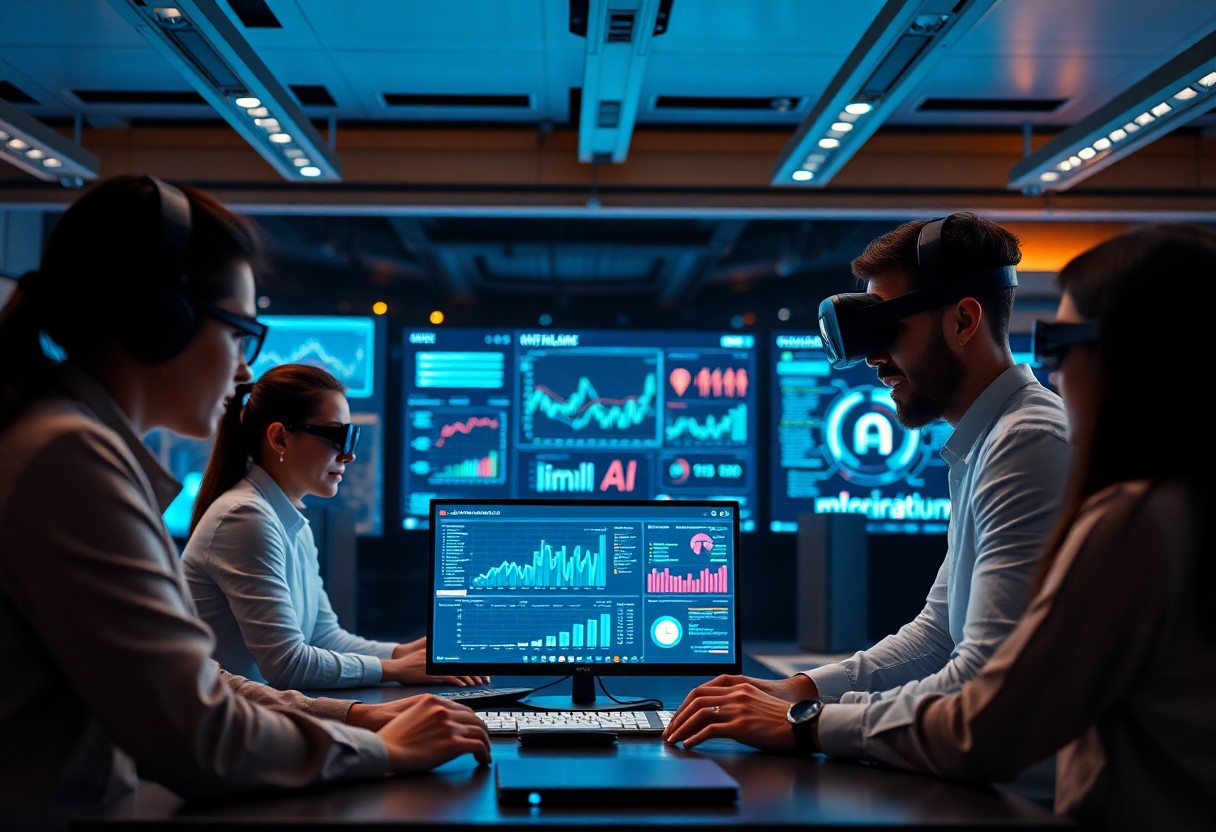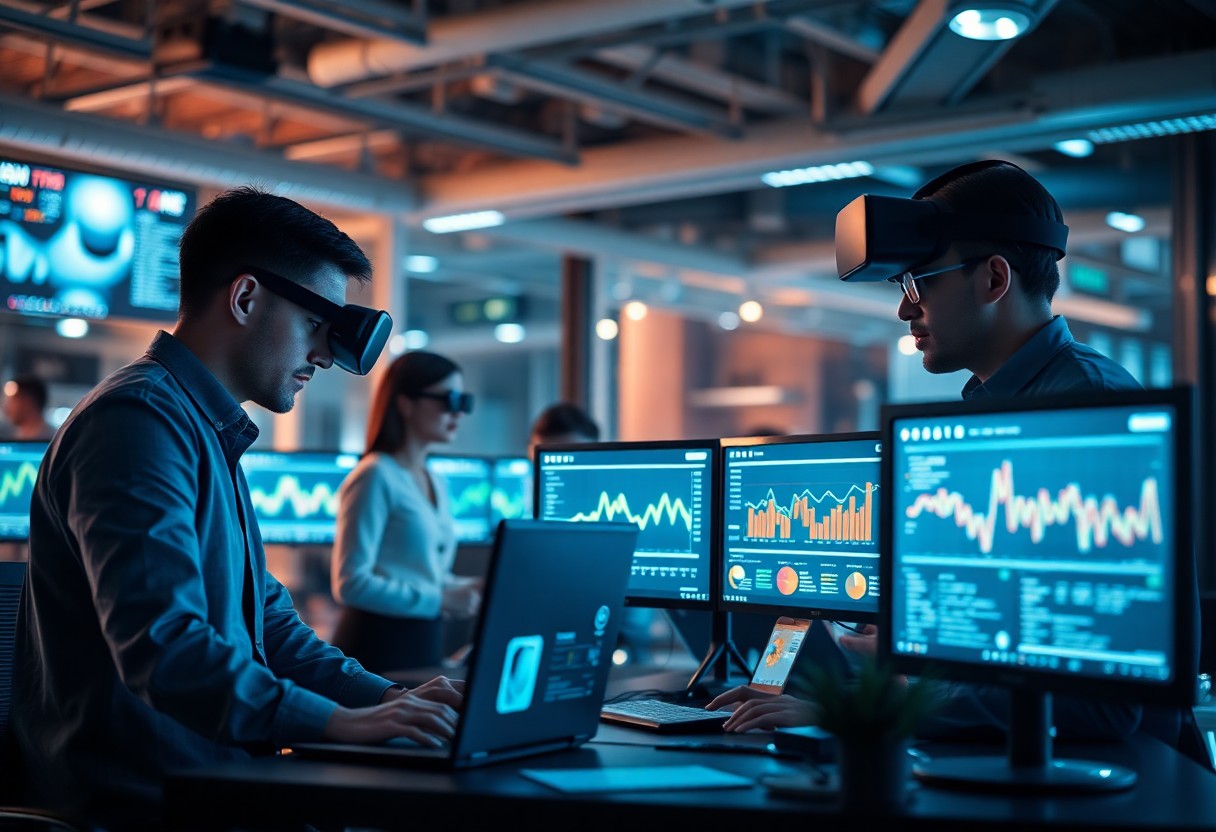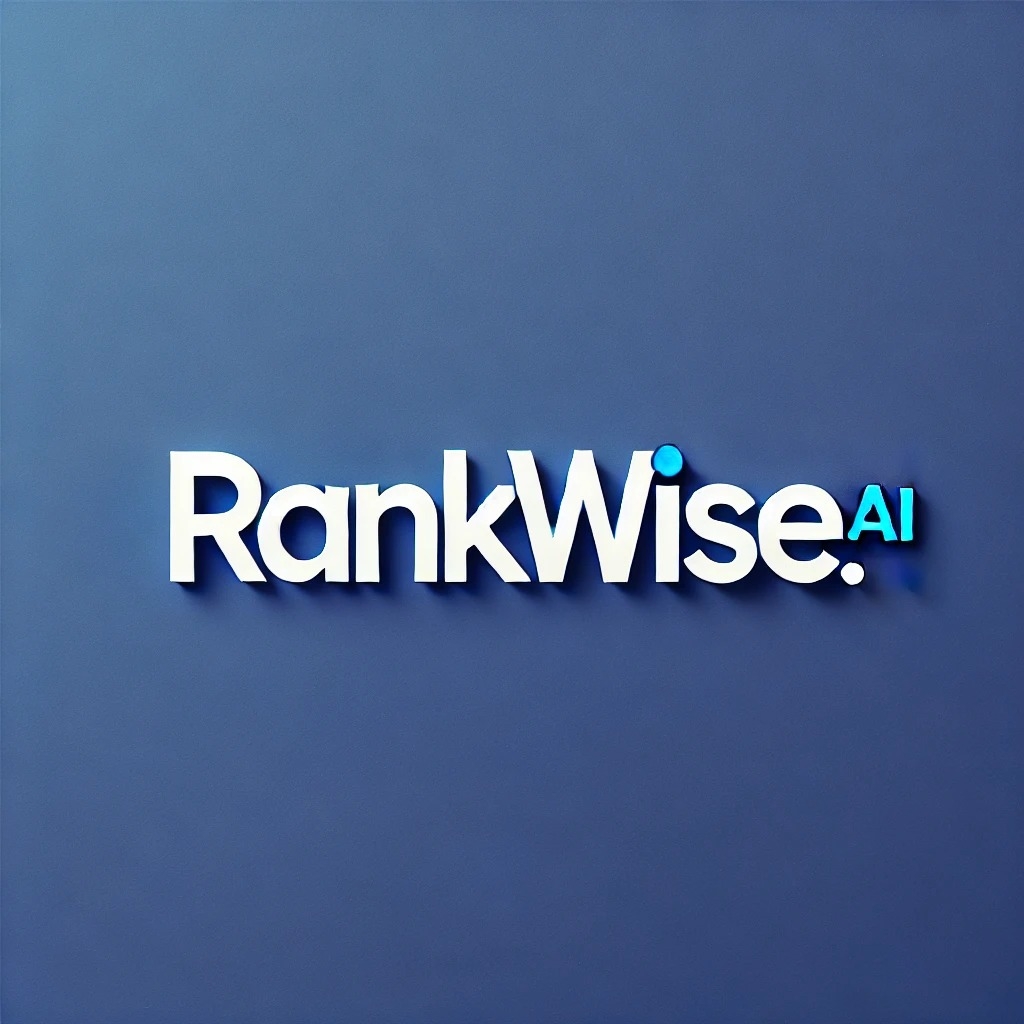
You are entering a new era of content creation, where AI optimization dramatically reshapes digital marketing strategies. Understanding how this transformation affects your approach to content can lead to more engaging and effective marketing. AI tools streamline content generation, enhance SEO performance, and provide insights that allow you to connect more deeply with your audience. As the landscape evolves, it’s vital to stay informed about these changes. Lets dive into more insights on How AI Is Changing The Content Creation Process And … today!

Key Takeaways:
- AI Integration: The incorporation of AI into content creation streamlines and enhances the efficiency of digital marketing strategies.
- Personalization: AI allows for targeted content that resonates with specific audience segments, improving engagement rates.
- Data Analysis: AI optimizes content by analyzing consumer behavior and preferences, leading to more effective marketing campaigns.
- Natural Language Processing: Advances in NLP enable the production of human-like text, increasing the authenticity of automated content.
- Content Distribution: AI tools facilitate the strategic distribution of content across multiple platforms, maximizing reach and impact.
- Cost Efficiency: Automation through AI reduces the costs associated with manual content creation and management.
- Future Trends: As AI technology continues to evolve, its role in content marketing will expand, further influencing industry standards.
The Rise of Content Creation
Historical Background
Before the advent of digital marketing, content creation was largely confined to traditional media sources such as newspapers, magazines, and television. Writers, journalists, and advertisers were the primary architects of content, producing material that often occurred in long cycles. This meant that you relied heavily on the pace of conventional publishing and the willingness of various media outlets to provide space for your voice. With the arrival of the internet, however, the power of content creation transformed significantly, allowing individuals to become publishers in their own right.
Before the widespread use of social media and blogs, the content landscape was limited and less interactive. Your options for engaging with audiences often included submitting articles for consideration or arranging costly ad placements. The democratization of content creation began with platforms like WordPress and social networks like Facebook and Twitter. These platforms empowered you to share your thoughts, ideas, and stories instantly, shifting the focus from gatekeepers to the creators themselves.
The Role of Human Creativity
Above all, human creativity remains a key component in the evolution of content creation. While AI technology can analyze data and optimize for engagement, it cannot replicate the unique perspective that only you can provide. Your experiences, emotions, and insights fuel the creative process, enabling you to establish genuine connections with your audience. Creative storytelling and personal touch elevate your content, allowing it to resonate on a much deeper level.
Hence, even in a landscape increasingly dominated by AI-driven tools, your role as a creative thinker is irreplaceable. The essence of your unique voice and style breathes life into the content you produce, ultimately enhancing its impact. AI can assist in streamlining processes and minimizing mundane tasks, but the heart of content—your ingenuity and originality—remains important.
Changing Consumer Expectations
Rise of the digital age has ushered in a new era of consumer expectations. Modern audiences increasingly demand engaging, personalized content that speaks directly to their needs and interests. As a result, your content must not only inform but also entertain and resonate with your target demographics. This heightened expectation challenges you to not only produce high-quality, relevant material but also to innovate constantly to keep your audience intrigued.
Rise of technology has further amplified these expectations. Users are now accustomed to instant gratification, meaning that your ability to deliver timely, relevant content can make or break your digital marketing strategy. In this fast-paced environment, maintaining a proactive approach towards your audience’s needs and preferences is more important than ever for the success of your content.
Further, understanding that consumers are increasingly inclined toward authenticity means you, as a content creator, need to be transparent and relatable in your approach. This shift represents an opportunity for you to build trust and rapport with your audience, making your content more effective and your brand more enduring. By embracing these expectations, you set yourself up for long-term success in the dynamic world of digital marketing.

Understanding AI in Content Creation
Any conversation about the future of digital marketing inevitably leads to Artificial Intelligence (AI) and its growing influence on content creation. As more businesses look to optimize their strategies, understanding AI’s role becomes necessary for your success. AI is no longer a distant technology; it is here, working alongside you to enhance efficiency and creativity in your content initiatives.
Defining Artificial Intelligence
Between the various definitions, AI can best be understood as the simulation of human intelligence processes by machines, especially computer systems. This definition encompasses areas such as learning, reasoning, and self-correction, which play a pivotal role in how content is created, managed, and distributed in digital marketing.
AI technologies also involve machine learning, where algorithms analyze data to improve their performance autonomously. These processes allow marketers and content creators like you to focus on strategic decisions while giving AI the tools to handle repetitive and data-heavy tasks. Additionally, AI can understand user preferences, allowing for more personalized content delivery and enhancing user experience.
Types of AI Technologies Used in Content Creation
Around the spectrum of AI applications, several technologies stand out in content creation. Each technology provides unique advantages that can transform how you approach your marketing efforts. Here are some key types:
| Natural Language Processing (NLP) | Helps analyze and generate human language for content creation. |
| Machine Learning Algorithms | Automates data analysis for trend recognition and prediction. |
| Chatbots and Virtual Assistants | Engages with customers in real-time, driving content interaction. |
| Content Generation Tools | Creates content drafts and ideas using AI analytics. |
| Social Media Analytics | Evaluates user engagement to optimize content strategy. |
In fact, each of these technologies carries the potential to revolutionize your content creation process by reducing manual workload, providing insights, and offering personalization. Understanding how to leverage these resources effectively can lead to more impactful marketing campaigns.
- Natural Language Processing (NLP) – Integral for understanding context and sentiment.
- Machine Learning – Powerful in analyzing trends and consumer behaviors.
- Content Generation Tools – Help you brainstorm and draft content more efficiently.
- Chatbots – Facilitate seamless communication with your audience.
- Analytics Tools – Offer insights to fine-tune your strategy.
Recognizing that AI technologies can complement your creative efforts allows you to focus more on ideation and less on tedious tasks. As a result, you can channel your creative energy into innovative and compelling content that resonates with your audience.
How AI Enhances Creativity
Creation of content is often viewed as an art, but when combined with AI, it becomes a powerful blend of creativity and technology. By analyzing vast amounts of data, AI helps you identify trends, customer preferences, and emerging topics that are relevant to your audience. This ability frees you from guesswork and enables you to harness data-driven insights for more focused content strategies.
Moreover, AI-generated suggestions can serve as a springboard for your creative process, helping you brainstorm new ideas or even draft articles. With tools that provide writing prompts or enhance your storytelling abilities, you can explore different angles and formats, thus expanding the creative possibilities available to you. AI doesn’t just execute pre-defined tasks; it empowers you to push the boundaries of your creativity.
Creativity is well complemented when you embrace AI in content creation. The positive influence AI has on your creative process lies in its ability to offer data-driven insights while automating repetitive tasks. This synergy enables you to focus on innovative ideas rather than burdening yourself with administrative duties. However, overreliance on AI can lead to a diluted creative voice, so maintaining a balance between human intuition and AI-driven suggestions is necessary.
The Transformation of Digital Marketing
Now, it’s important to recognize how rapidly the landscape of digital marketing has evolved. As technology has advanced, so have the methods and strategies employed by marketers. The shift from conventional marketing tactics, such as print advertisements and television commercials, to a more integrated digital approach has profoundly impacted the way you engage with your audience. With the rise of the internet and mobile devices, traditional marketing methods have become less effective, compelling businesses to explore new avenues that allow them to connect with their customers on a more personal level.
The Shift from Traditional to Digital Marketing
For many years, businesses relied heavily on traditional marketing methods to promote their products and services. However, as consumer behavior changed, so did the channels through which you reach your target audience. Digital marketing encompasses a wide array of strategies, including social media marketing, search engine optimization (SEO), and email marketing. These strategies enable you to engage with your audience in real-time, allowing for instant feedback and interaction.
Transitioning to digital marketing means that you can effectively track the performance of your campaigns, analyze metrics, and adjust your strategies accordingly. You can leverage tools and platforms that give insight into customer preferences and behaviors, facilitating a more tailored approach to your marketing efforts. This shift not only broadens your reach but also enhances your ability to produce targeted and relevant content that meets the specific needs of your audience.
AI’s Role in Personalizing User Experience
Above all, artificial intelligence (AI) has emerged as a pivotal force in transforming digital marketing by enabling businesses to create highly personalized experiences for their users. You can now analyze vast amounts of data to better understand your audience’s preferences and behavior patterns. This leads to more informed decisions regarding content creation, product recommendations, and targeted advertising, ensuring that your marketing messages resonate with the right people.
Shift your focus towards utilizing AI tools that not only enhance your content but also tailor it to your audience’s needs. AI algorithms can analyze user interactions and feedback in real-time, allowing you to refine your strategies effectively. By personalizing your messaging, you can build stronger connections with your audience, fostering loyalty and driving conversions.
Data-Driven Decision Making in Marketing
Among the many advantages of modern digital marketing is the emphasis on data-driven decision making. You can go beyond gut feelings and rely on measurable outcomes to inform your marketing strategies. The availability of analytics tools provides you with valuable insights into customer interactions, engagement rates, and conversion statistics, ensuring that your campaigns are as effective as possible.
This data-centric approach not only enhances your ability to gauge the effectiveness of your strategies but also helps you identify trends and opportunities that can inform future projects. By closely analyzing these metrics, you can allocate your resources more effectively, maximizing your return on investment and minimizing waste in your marketing initiatives.
It’s imperative to embrace data-driven strategies as they empower you to respond swiftly to market changes and continuously optimize your approach. By integrating AI into your data analysis processes, you’ll be equipped to make predictions and craft campaigns that resonate with your audience, further enhancing the impact of your marketing efforts.

AI Optimization Techniques in Content Creation
Unlike traditional content creation methods that often rely heavily on human input, AI optimization techniques are revolutionizing the way you develop and distribute content. These advanced technologies not only enhance productivity but also improve the quality and relevance of the material being produced. As you embrace AI in your content strategy, you’ll find that the combination of data-driven insights and machine learning can lead to more targeted and engaging pieces that resonate with your audience.
Content Generation Tools
Any digital marketer today can harness the power of content generation tools powered by AI. These tools can create articles, social media posts, and even entire blogs with minimal human oversight. By analyzing vast amounts of data and user behavior, these systems can generate content that is not only relevant but also tailored to current trends and audience preferences. This means that you can save time on writing and focus on refining your overall strategy while still maintaining a strong online presence.
Additionally, the implementation of natural language processing (NLP) allows AI systems to produce content that sounds human-like, making it easier for your audience to engage with. The integration of these tools into your workflow can result in a significant uplift in content marketing effectiveness while providing you with more data and insights to optimize future campaigns.
SEO Optimization through AI
For many marketers, search engine optimization (SEO) is a top priority, and AI optimization plays a vital role in enhancing your SEO strategies. With AI, you can analyze search trends and keywords in real-time, enabling your content to rank higher in search results. AI tools can provide recommendations for keywords along with analysis on competitive rankings, allowing you to tailor your content precisely to what your audience is searching for. By leveraging these tools, you ensure that your content reaches the right users at the right time.
The use of AI-driven algorithms allows you to monitor how your content performs over time. You can gain insights into bounce rates, click-through rates, and user engagement to make informed decisions on how to adjust your content strategy moving forward. This data-driven approach minimizes guesswork and empowers you to create content that not only attracts but also retains your audience.
Tailoring Content for Target Audiences
Optimization of your content for specific audiences is another area where AI excels. Through behavioral analytics and demographic data, AI tools enable you to create customized content that speaks directly to your target market. By segmenting your audience based on preferences and behaviors, you can develop materials that align more closely with their interests and needs. This personalized approach contributes to higher engagement rates and customer loyalty.
To ensure that your content resonates with your target audience, consider utilizing AI to monitor audience feedback and engagement patterns over time. This feedback loop can guide your content creation and help you adapt your messaging to better align with audience desires, resulting in more impactful and effective marketing campaigns.
The Benefits of AI in Digital Marketing
Your approach to digital marketing is about to undergo a significant transformation, thanks to the integration of artificial intelligence. The benefits of AI are becoming increasingly evident, streamlining your marketing processes and providing a competitive edge in an ever-evolving landscape. For a deeper look into the impact of AI on content creation, check out The Evolution of Content Creation: How AI is Transforming ….
Increased Efficiency and Productivity
Around the globe, businesses leveraging AI technologies are experiencing remarkable increases in efficiency. By automating repetitive tasks such as data entry, social media posting, and even content creation, you’re freeing up your team to focus on strategy and creativity. AI tools can analyze performance metrics in real-time, allowing for swift adjustments to your campaigns, ultimately enhancing productivity and leading to faster results.
Moreover, AI’s ability to personalize content ensures that your messaging resonates with target audiences. By analyzing user behavior and preferences, AI systems can help you tailor your campaigns to maximize engagement, which means you’re delivering relevant content to the right people at the right time. This level of customization drives efficiency and ensures a more effective use of your resources.
Enhanced Data Analysis Capabilities
Among the many advantages AI brings, one of the most noteworthy is its enhanced data analysis capabilities. As a digital marketer, you know that data is a powerful resource, but processing and interpreting large volumes of data can be overwhelming. AI simplifies this by automating data collection and providing insights that are both actionable and timely. This not only aids in strategy formation but also enhances your ability to make data-driven decisions.
Efficiency in data analysis allows for real-time tracking of your marketing campaigns, making it easier to identify what works and what doesn’t. This can lead to more agile marketing strategies, where you adapt and pivot based on insights gleaned from customer behavior, ensuring that your offerings are always in line with market demand.
Improved Engagement and Reach
Between your audience’s growing expectations and the expanding digital landscape, capturing their attention is increasingly challenging. AI-driven tools can help you craft more engaging content by analyzing trends and user interactions. By understanding what resonates with your target demographic, you can enhance your messaging and delivery, leading to improved engagement and a broader reach.
Moreover, AI can facilitate personalized communication through smart segmentation and targeted advertising, which allows you to connect with your audience on a more personal level. This not only increases the chances of engagement but also fosters loyalty, as customers feel valued and understood.
Marketing with AI doesn’t just improve your effectiveness; it can also lead to a substantial increase in your customer base. By leveraging AI to optimize your digital strategies, you can reach audiences that might have previously been out of your grasp, ensuring that your brand continues to thrive in a competitive marketplace.
Challenges and Ethical Considerations
Keep in mind that while AI optimization offers exciting advantages in digital marketing, you must confront several challenges and ethical considerations. The rapid integration of AI tools into content creation and marketing strategies raises questions about creativity, privacy, and the balance between human oversight and automation. As you navigate this evolving landscape, staying informed about potential pitfalls is important to maintaining integrity and effectiveness in your marketing efforts.
The Over-reliance on AI
Against the backdrop of AI’s capabilities, one significant concern is the over-reliance on AI. While AI algorithms can enhance efficiency and streamline processes, they may inadvertently stifle genuine creativity. The natural intuition and emotional intelligence that human creators bring to their work cannot be fully replicated by machines. When you lean too heavily on AI for content generation, you risk producing material that feels impersonal and lacks the nuance required to resonate with your audience.
Moreover, an excessive dependency on AI tools can lead to homogenization in content, creating an oversaturated market of similar ideas and narratives. To stand out, you must find a way to blend AI capabilities with your unique voice and storytelling style, ensuring that your marketing efforts reflect both innovation and authenticity.
The Balance of Human and Machine Creativity
Below the surface of any successful digital marketing strategy lies a delicate balance of human and machine creativity. While AI can optimize processes and deliver valuable insights, it is important to maintain your unique perspective and emotional connectivity with your audience. Integrating human intuition with AI’s powerful data analysis capabilities can result in more effective marketing campaigns that truly resonate with your target demographic.
Human creativity brings the art of storytelling and personal engagement that is often lacking in AI-generated content. Marketers must not overly depend on AI for their entire content creation process; instead, blend AI-generated insights with your original thoughts and experiences. This synthesis allows for a richer, more authentic connection with your audience, helping you convey messages that reflect your brand values while effectively leveraging AI tools for optimization.
Privacy Concerns in Data Utilization
One of the most pressing challenges in the age of AI is the privacy concerns in data utilization. As AI systems analyze vast amounts of data to generate insights and optimize marketing strategies, the risk of compromising user privacy becomes a significant issue. Consumers are becoming increasingly aware of how their personal information is being used, leading to heightened concerns about data security and consent. To build trust with your audience, you must prioritize transparency around your data practices and ensure compliance with relevant regulations.
With ethical marketing practices, you can create a trustworthy relationship with your audience. Implementing robust data protection measures, obtaining explicit consent, and being transparent about how you utilize consumer data will empower you to minimize potential privacy risks. Respecting user privacy not only aligns with ethical standards but also enhances your brand’s reputation and fosters long-term customer loyalty.
Balance is the key when addressing privacy concerns; you can harness the power of AI while effectively safeguarding user data. By prioritizing ethical considerations in your data practices, you will not only comply with regulations but also position your brand as a responsible entity in an increasingly AI-driven digital landscape.
For further insights on AI’s influence on marketing trends, check out the article on How AI is Transforming Digital Marketing in 2024: Trends, Tools, and Tactics for Success.

Future Trends in Content Creation and Marketing
All signs point to a future where content creation and digital marketing will become increasingly integrated with advanced technology. As marketers and creators like you embrace emerging technologies, the landscape of digital content will undergo significant transformations. For instance, tools employing machine learning algorithms will enable you to analyze customer behavior more accurately, leading to more personalized content strategies. The raised expectations for quality engagement also mean that you will need to stay ahead of trends and leverage innovations to captivate your audience.
Emerging Technologies and Their Implications
Before diving deeper, it’s crucial to consider how emerging technologies will reshape the content creation process. Technologies like augmented reality (AR) and virtual reality (VR) are already offering more immersive experiences, allowing you to engage your audience in ways that conventional content simply cannot. As access to affordable AR and VR tools becomes more widespread, you can create rich storytelling experiences that foster deeper connections with your consumers. Additionally, the integration of AI in generating visual content, such as graphics and video, will assist you in saving time while improving your output quality.
Predictions for the Next Decade
Future outlooks suggest a marked shift towards hyper-personalization in your content marketing efforts. As AI systems become more adept at understanding individual consumer preferences, you will find that the demand for tailored content will increase. Moreover, platforms will evolve to host more interactive content formats, which will require you to rethink your approach and strategies. This will inevitably lead to more strategies focused on user-generated content, allowing you to draw on authentic voice and community engagement.
Marketing experts forecast that the next decade will see an exponential rise in cross-channel marketing strategies. You will need to adapt digital campaigns in real-time, pivoting between various platforms based on data insights, which AI optimization provides. As tools evolve, your ability to accurately predict trends and craft strategies will be enhanced, thus fostering a more loyal and engaged audience.
Preparing for a Hybrid Creative Environment
After exploring the technological advancements, it’s time to focus on how you can prepare for a hybrid creative environment. The current paradigm emphasizes the blending of human creativity with AI-driven optimization. You can enhance your productivity and creativity by embracing collaboration across various departments and disciplines. Utilizing AI tools for tasks like data analysis and content curation allows you to free up time, enabling you to devote more energy to ideation and creativity.
Decade-long shifts in your work environment will increasingly require you to adapt tools and processes to promote a more collaborative atmosphere. Think of the hybrid environment as an opportunity to embrace innovative approaches to content creation. By integrating AI tools into your processes and valuing diverse input from various team members, you can maximize the potential of your content strategies, ensuring that you’re well-positioned for the complexities of the future.
Summing up
Conclusively, you are witnessing a transformative phase in digital marketing where AI optimization is reshaping the landscape of content creation. As you leverage advanced algorithms and data analytics, you can enhance your marketing strategies to generate more engaging and personalized content. This not only improves the user experience but also increases conversion rates, making your campaigns more effective. By embracing AI tools, you can efficiently optimize your content, allowing you to focus on creativity while technology handles the metrics.
Moreover, as you navigate this evolution, it becomes increasingly important to adapt your skills and knowledge to keep pace with ongoing advancements. Utilizing AI-driven insights enables you to make informed decisions and tailor your strategies to meet the ever-changing demands of your target audience. By integrating AI into your content creation process, you position yourself at the forefront of digital marketing innovation. This dynamic synergy between human creativity and machine intelligence is set to redefine how you approach your marketing efforts, driving notable results in your endeavors.
FAQ
Q: What role does AI play in content creation for digital marketing?
A: AI assists in content creation by analyzing vast amounts of data to understand trends, audience preferences, and optimal keywords. It helps marketers generate personalized content, automate repetitive tasks, and optimize articles or campaigns for search engines, ultimately enhancing the efficiency and effectiveness of their marketing strategies.
Q: How does AI optimization improve audience targeting in digital marketing?
A: AI optimization improves audience targeting by leveraging machine learning algorithms to analyze user behavior, preferences, and demographics. This allows marketers to create highly tailored content that resonates with specific audience segments, increasing engagement rates and conversion potential, thus fostering stronger connections between brands and consumers.
Q: Can AI enhance the creative process in content creation?
A: Yes, AI can enhance creativity by offering insights and suggestions based on data analysis. Tools powered by AI can generate content outlines, recommend topics, and even suggest headlines that are likely to perform well. Additionally, AI-driven design tools can assist in visual storytelling, helping content creators explore new ideas and formats.
Q: What are the benefits of using AI for SEO optimization in digital marketing?
A: Utilizing AI for SEO optimization offers numerous benefits, including automatic keyword analysis, identifying content gaps, and optimizing website structures. AI tools can predict trends and analyze competitors’ strategies, aiding marketers in improving their search engine rankings. By enhancing on-page and off-page SEO strategies, businesses can increase visibility and attract more organic traffic.
Q: Are there any challenges in implementing AI in content creation and digital marketing?
A: Yes, challenges include potential reliance on AI-generated content, which may lack the human touch and emotional resonance. Additionally, data privacy concerns and the need for substantial training data can hinder AI adoption. Marketers must strike a balance between leveraging AI’s capabilities and ensuring authenticity in their communications, maintaining the human element in digital marketing strategies.





